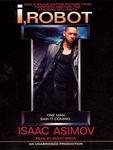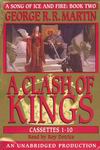
 Legends II: Volume III
Legends II: Volume III
Edited by Robert Silverberg
Containing stories by Robert Silverberg, Neil Gaiman, and Orson Scott Card
Read by Jason Culp, Peter Bradbury, and Michael Emerson
4 Cassettes – 7 hours [UNABRIDGED]
Publisher: Random House Audio
Published: 2004
ISBN: 0739310860
Themes: / Fantasy / Majipoor / Mythology / Alternate History / Gods /
The cover of this audiobook prominently displays the names “Neil Gaiman” and “Orson Scott Card”, so I was a bit surprised to find a Robert Silverberg story leading off the collection. It probably shouldn’t have been unexpected, because a look at the back of the audiobook includes blurbs from all three stories – it’s just from the front, the audio appears to include two stories, not three.
“The Book of Changes” is set in Silverberg’s Majipoor universe and is a fine story about an epic poet’s discovery and subsequent writing of his masterwork. The story is steeped in the history of Majipoor, but is clear and enjoyable to a person unfamiliar with that history, as I am. Silverberg has created a world that is as much science fiction as it is fantasy. In Majipoor’s past, humans colonized then got into a war with the native inhabitants. These past events are discussed in Silverberg’s story, but the tale is firmly focused on the poet and the act of creation – something Silverberg knows much about. Jason Culp’s performance was near perfect.
The second novella in the collection is “Monarch of the Glen”, written by Neil Gaiman. The story starts in a hotel bar where Shadow (the main character from Gaiman’s American Gods) is talking to a Scotsman. It is immediately notable that the story is in good hands with Peter Bradbury, whose crisp, clear accents place the listener firmly in the setting which in this case is Northern Scotland. The scotsman offers Shadow a job as a bouncer, but Shadow knows that something is afoot beyond the obvious. Neil Gaiman provides a story that is just as mythic and mysterious and unexpected as his previous fiction. This is a Gaiman story through and through, which is as marvelous a thing as a visit from a good friend.
Last up is Orson Scott Card’s “The Yazoo Queen,” which is set in his Alvin Maker universe. It’s read by Michael Emerson, who performs a sort of old-west style voice which works very well with the prose Card writes with throughout the series – conversational with plenty of 19th century slang and pronounciation. THe story is a prologue to The Crystal City, the sixth novel in the series. In the story, Alvin Maker and Arthur Stuart meet Jim Bowie and Abraham Lincoln while travelling on the Mississippi River. Card’s world is early 19th century America where the Revolutionary War never took place and the magic (called “knacks”) that superstitious folks believed in back then really works. Alvin, the focus of all the stories, is a maker – he can see into things and change them, making them better. He’s chasing after the Unmaker and each volume in the series is building toward a confrontation between the two.
Another notable thing about this audio is that each story is preceded by a summary of what the series is all about. I found each one interesting – in the case of Silverberg’s Majipoor, it was all new information and in the case of the other two, it was a recap for me. But in all three cases it was very welcome.
Three very enjoyable stories read by three top-notch narrators – highly recommended!
Posted by Scott D. Danielson





